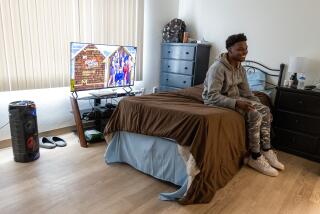Op-Ed: White progressive parents and the conundrum of privilege
Greg and Sarah live in a predominantly white neighborhood and send their children to a predominantly white private school. “I don’t want to believe we are hypocrites,” Greg tells me. “But if we say diversity is important to us, but then we didn’t stick around in the place that was diverse, maybe we are?” He looks at Sarah. “I dunno,” he continues, “I guess we made decisions based on other things that were more important. But what does that say about us then?”
For two years I conducted research with 30 affluent white parents and their kids in a Midwestern metropolitan area. Over and over I heard comments like Greg’s reflecting a deep ambivalence: As progressive parents, is their primary responsibility to advance societal values — fairness, equal opportunity and social justice — or to give their children all the advantages in life that their resources can provide?
More often than not, values lost out.
Parents I interviewed felt conflicted about using their social status to advocate for their kids to have the “best” math teacher, because they knew other kids would be stuck with the “bad” math teacher. They registered the unfairness in leveraging their exclusive social networks to get their teenagers coveted summer internships when they knew disadvantaged kids were the ones who truly needed such opportunities. They felt guilty when they protectively removed their children from explicitly racist and contentious situations because they understood that kids of color cannot escape racism whenever they please. Still, those were the choices they made.
“I care about social justice, but — I don’t want my kid to be a guinea pig.”
Parents felt caught in a conundrum of privilege — that there was an unavoidable conflict between being a good parent and being a good citizen. These two principles don’t have to be in tension, of course. Many parents, in fact, expressed a desire to have their ideals and parenting choices align. In spite of that sentiment, when it came to their own children, the common refrain I heard was, “I care about social justice, but — I don’t want my kid to be a guinea pig.”
In other words, things have been working out pretty well for affluent white kids, so why rock the boat? And so parents continue to make decisions — about where to buy a house, which school seems best, or whether robotics club or piano lessons is a better after-school activity — that extend the advantages of wealth. Those choices, however, have other consequences: They shape what children think about race, racism, inequality and privilege far more than anything parents say (or do not say).
Children reach their own conclusions about how society works, or should work, based on their observations of their social environment and interactions with others — a process that African American studies scholar Erin Winkler calls “comprehensive racial learning.” So how their parents set up kids’ lives matters deeply.
Some children in my study, for instance, came to the conclusion that “racism is over” and that “talking about race makes you racist” — the kind of sentiments that sociologists identify as key features of colorblind racism. These were kids who were growing up in an almost exclusively white, suburban social environment outside the city.
Enter the Fray: First takes on the news of the minute from L.A. Times Opinion »
The kids who lived in the city but attended predominantly white private schools told me that they were smarter and better than their public schools peers. They also thought they were more likely to be leaders in the future. One boy said proudly, “My school is not for everyone” — a statement that reflected how thoroughly he’d absorbed his position in the world in relation to others.
And yet, other white kids living in the city concluded that racism “is a way bigger problem than people realize. … White people don’t realize it… because they are scared to talk about it.” These young people spoke passionately about topics like the racial wealth gap and discrimination. They observed how authority figures such as teachers and police officers treated kids of color differently. They more easily formed interracial friendships and on occasion worked with their peers to challenge racism in their community. These were children who were put in racially integrated schools and extracurricular activities purposefully by their parents.
Still, even some of those parents’ actions reproduced the very forms of inequality they told me they intellectually rejected. They used connections to get their children into selective summer enrichment programs or threatened to leave the public school system if their children were not placed in honors or AP courses that they knew contributed to patterns of segregation. So even as parents promoted to their kids the importance of valuing equality, they modeled how to use privilege to get what you want. White kids absorbed this too; they expected to be able to move easily through the world and developed strategies for making it so.
If affluent, white parents hope to raise children who reject racial inequality, simply explaining that fairness and social justice are important values won’t do the trick. Instead, parents need to confront how their own decisions and behaviors reproduce patterns of privilege. They must actually advocate for the well-being, education and happiness of all children, not just their own.
Being a good parent should not come at the expense of being — or raising — a good citizen. If progressive white parents are truly committed to the values they profess, they ought to consider how helping one’s own child get ahead in society may not be as big a gift as helping create a more just society for them to live in in the future.
Margaret A. Hagerman is a sociology professor at Mississippi State University and author of “White Kids: Growing Up with Privilege in a Racially Divided America.”
Follow the Opinion section on Twitter @latimesopinionand Facebook.
More to Read
A cure for the common opinion
Get thought-provoking perspectives with our weekly newsletter.
You may occasionally receive promotional content from the Los Angeles Times.






